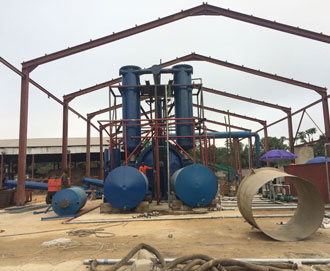The recently released Ellen MacArthur report singled out Enval’s microwave induced pyrolysis technology as a way to recycle plastic and aluminium while achieving energy savings as part of the circular economy.
The foundation is named after Dame Ellen MacArthur, record-breaking sailor, and was established to accelerate the transition to a circular economy by influencing business, governments and academia.
The foundation’s report,was presented at the World Economic Forum in Davos, and focuses on the issues associated with the growing use of plastics worldwide.
The report states that plastics production has increased twentyfold since 1964, to reach 311 million tonnes in 2014 alone. It is expected to double again in the next 20 years and almost quadruple by 2050. The creation of all this new plastic will consume 20 per cent of all oil production within 35 years, up from an estimated five per cent today.
Despite the growing demand, just 5% of all plastics are properly recycled, with 40% ending up in landfill and a third in fragile ecosystems such as the world’s oceans. This means that by weight, there will be more plastics than fish in the oceans by 2050.
But solutions are being developed, including Enval’s pyrolysis process, which the report details under a section calling for innovation in reprocessing technology.
Enval’s technology recycles and reclaims material from plastic aluminium laminates, which are seeing massive growth in consumer product packaging – such as toothpaste tubes and pet food pouches – but are currently not recycled. Through microwave induced pyrolysis, Enval recycles the laminate materials, converting plastic into useable oil and reclaiming the aluminium for smelting.
Enval founder and chief executive, Dr. Carlos Ludlow-Palafox, one of the experts consulted for the report, explained: “The companies developing pyrolytic processes to deal with waste plastics need to be careful about what we promise. In the past we’ve had a perception problem that pyrolysis would solve the world’s waste problem – I call it the ‘Back to the Future syndrome’, after Doc Brown powers the DeLorean with rubbish and flies away to the future.
“The reality is that although pyrolysis is important, it’s not a one-size-fits-all process applicable to everything. That’s why Enval decided to target one waste material: laminate packaging. Our process tackles the plastic ‘problem’ but also recovers the valuable aluminium for resmelting.”
The report states: “Despite these hurdles in establishing material recovery loops for plastics, there are certain applications in which pyrolysis could play a role today. For plastic-aluminium laminates, a pyrolysis process has been developed by Enval.
“For these products, pyrolysis has the advantage that no combustion takes place, which means the aluminium (having a large footprint) is recovered at high quality.”
The report also mentions Enval’s technological advantage of being powered by electric heating (microwaves) instead of conventional heating.
“Driving the (pyrolysis) process with renewable energy in the future could be another option to explore. One way to achieve both energy savings and the electrification that facilitates the shift to renewable energy sources is the microwave driven pyrolysis process that is currently used by Enval and Climax Global Energy.”
It is important that pyrolysis is viewed as a tool rather than a destination, Ludlow-Palafox said, especially in the context of the circular economy, which the Ellen MacArthur Foundation is focused on achieving.
“Some people say pyrolysis should not be considered part of the circular economy as it results in a product (oils from plastic) not necessarily suitable for the same product (i.e. more plastic packaging) and often ends up being used as liquid fuels.
“But we need to see there are circles within circles! If we continue developing pyrolytic technology for end of life plastics, at some stage we will have technology allowing us to return oils to the petrochemical industry to be used for any purpose and not just packaging. What could be more circular than going back to the very beginning?
“We’re very proud of having been consulted for the report, which is rightfully attracting a lot of attention across industry and government. We just hope that in the future it’s remembered as a turning point for how modern society deals with the enormous amount of plastic products we all use and consume.”
Article source:http://www.packagingnews.co.uk/news/materials/rigid-plastics/enval-offers-solution-to-tomorrows-plastic-problem-11-02-2016


